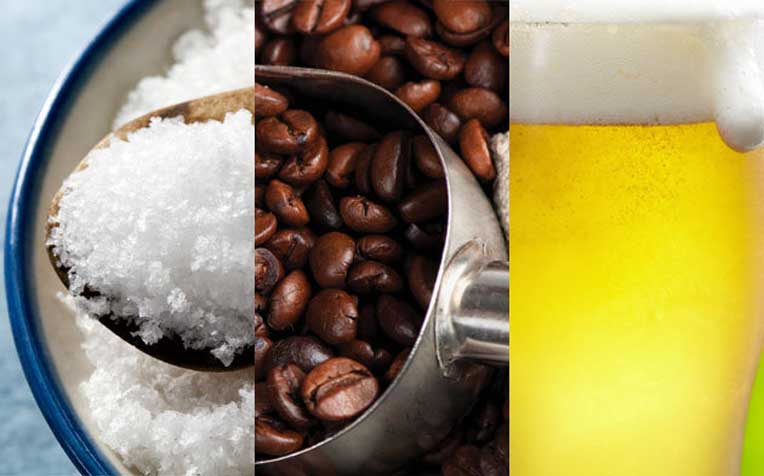HealthXchange will NEVER ask you to transfer money over a call. If in doubt, call the 24/7 ScamShield helpline at 1799, or visit the ScamShield website at www.scamshield.gov.sg.
Osteoporosis: Foods to Avoid

Consuming excessive quantities of salt, caffeine and alcohol and even protein can have a negative impact on your bone health.
The best osteoporosis diet is not just about eating calcium-rich foods. It’s also about avoiding certain foods that can impact your bone health when eaten in large quantities. Follow the advice of the Department of Dietetics at Singapore General Hospital (SGH), a member of the SingHealth group, on what you should not eat too much of.
For strong, healthy bones, go easy on…
- Salt
Salt is present in nearly all fresh and processed foods, including condiments, preserved vegetables, chips and even whole grain breads. The Singaporeans’ go-to for fast food, hawker fare, is also usually laden with salt.
This is a concern because a high sodium intake increases the amount of calcium eliminated in the urine, hence increasing calcium loss from bone.
The Health Promotion Board recommends that adults get no more than 2,000 mg of sodium a day (equivalent to a teaspoon of salt). The average Singaporean, shockingly, consumes 3,257 mg of sodium a day.
- Alcohol
- 2/3 can (220ml) of regular beer
- 1 glass (100ml) of wine
- 1 nip (30ml) of spirit
Stick to the recommended daily limit of three standard drinks for men, and two for women, and booze shouldn’t pose a risk. A standard drink is equivalent to:
Any more could interfere with the absorption and use of calcium, vitamin D and other bone nutrients, ultimately leading to an increased risk of osteoporosis.
This would result in adverse effects on bone-forming cells (osteoblast) and hormones that regulate calcium metabolism.
Chronic and heavy alcohol consumption is also associated with malnutrition (a risk factor of osteoporosis) due to prolonged inadequate food intake.
Additionally, getting a little tipsy affects balance and gait, upping the risk of falls and fractures.
- Caffeine
Some studies have suggested that drinking more than two to three cups of coffee a day could increase bone loss in post-menopausal women.
In these studies, caffeine was shown to increase urinary calcium excretion as well as reduce calcium absorption.
Fortunately, there’s no need to cut out java completely.
Recent studies suggest that moderation of caffeine consumption with adequate intake of calcium (about 800 mg a day) does not cause any damaging effects on bones.
Thus, if you’re a coffee lover, just be on the safe side by ensuring an adequate intake of calcium, with moderate caffeine intake.
- High-protein diets
Bones are about 50 per cent protein, and research shows that sufficient protein intake is important for maintaining bone mass density and skeletal metabolism. However, some studies caution that prolonged, over-consumption of “acidic” foods such as protein could lead to bone loss.
Everyday bodily functions such as digestion produce chemicals (acidic, neutral, or alkaline) that change the acid-base balance in the body. As a buffering system, kidneys play a major role to ensure the blood stay at optimum balanced levels.
So if a person’s diet is too high in protein and lacking in more alkaline food like fruits and vegetables, alkaline minerals such as potassium, calcium and magnesium could theoretically be withdrawn from bone reserves to ensure an optimal acid-base balance.
Definitive studies have yet to be carried out, but in the meantime, strive for a balanced diet to stave off osteoporosis and a host of other diseases. The recommended intake of protein is two to three servings a day.
One serving could be five medium prawns, or a palm-sized piece of meat, fish or poultry, two glasses of milk, ¾ cup cooked pulses or lentils, or two small blocks of soft beancurd (170g).
Ref: U11
Related Articles
Public Events
Get the Health Buddy App
© 2025 SingHealth Group. All Rights Reserved.


















 Get it on Google Play
Get it on Google Play